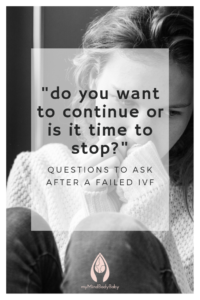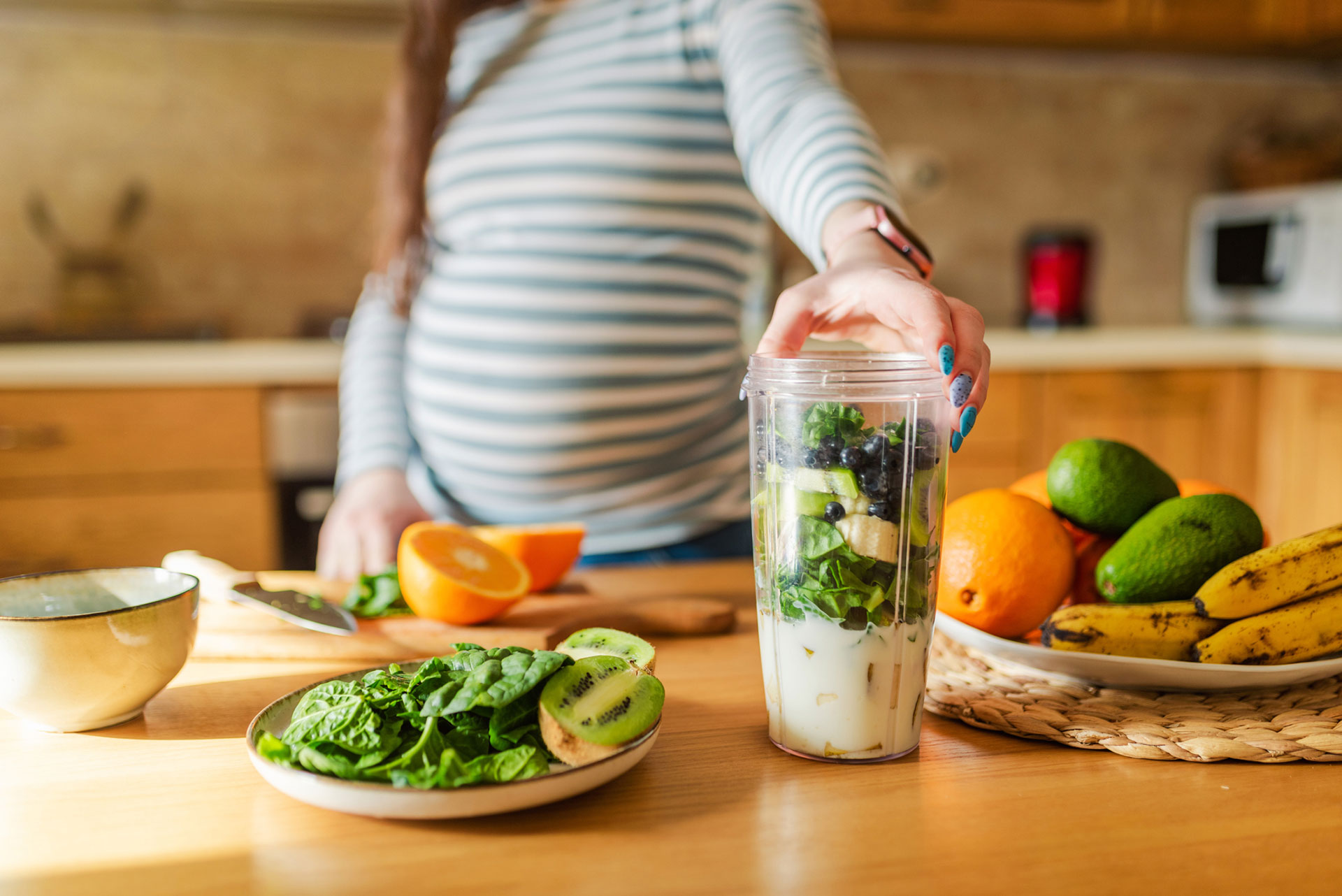“After a Failed IVF” | myMindBodyBaby
There is so much that goes into the decision to turn to IVF. It requires mental, physical, emotional and financial consideration and after all that, what happens after a failed round of IVF? I found myself asking this question a few years ago.
IVF failure is devastating.
First, the utter devastation of a failed IVF is like nothing I have experienced before. There is so much hope and anticipation at the beginning of the cycle only to have it all come to a crushing end. My husband and I were left with only two embryos after our first round of IVF. Our first transfer was a fresh transfer and did not result in a pregnancy. Our subsequent frozen embryo transfer a few months later resulted in a pregnancy that devastatingly ended in a miscarriage at 9 weeks. It was the lowest moment in my life. My husband and I were completely crushed. What went wrong? After this blow I started to dig a bit deeper and learned there are multiple ways an IVF cycle can fail.
The Numbers behind Failed IVF
The Centre for Disease Control and Prevention reported the stats from US fertility clinics in 2016: just over 264 thousand cycles of IVF were performed, 66 thousand were banking cycles and only 66 thousand ended in delivery. So what happens the rest of the time?
Poor Gamete Quality
Gametes are our reproductive cells – eggs and sperm. If either sperm or egg is lower quality it can result in lower rates of fertilization, or lower resulting embryo quality.
Egg Quality
Women are born with all the eggs they will ever have – no new ones are created. Each month anywhere from 3-30 primordial eggs begin to mature in your ovaries and the most mature, or “ripe”, is then released and travels down your fallopian tube. During the maturation the cell is growing and dividing. Mature egg quality can be impacted by a variety of factors including age, genetics and hormone response. As you age your eggs have a greater chance of accumulating errors in their DNA as the cells divide, leading to genetic abnormalities. Inheritable chromosomal abnormalities can also impact viability.
While only one egg usually matures, each cycle roughly 3-30 follicles are contenders for ovulation. In a normal cycle the follicles that do not mature are lost. During a medicated cycle the hormones help your ovaries mature more than one egg. The medication and your hormone levels are closely monitored to ensure controlled growth of the eggs. When overstimulation occurs some research has shown the resulting higher number of eggs can have a higher incidence of genetic abnormalities.
There are a few supplements that researchers are investigating for helping to improve egg quality, primarily DHEA and CoQ10. While more research is needed for both of these supplements, if you are interested in evaluating options for improving egg quality we recommend speaking with your healthcare provider to assess your ovarian reserve and options to improve egg quality.
Sperm Quality
The quality of sperm is also important in creating a healthy embryo. There are medical, lifestyle and environmental factors that can impact sperm quality.
Medical Factors include:
- celiac disease
- varicocele
- infection
- structural abnormalities (testes or tubes)
- tumors
- chromosomal defects
- hormonal imbalance
Lifestyle Factors include:
- Smoking
- Alcohol and drug use
- Stress
- Work or hobbies that involve prolonged sitting (although research here is in consistent)
- Weight (and it’s impact to hormone production)
Environmental factors include:
- testicular overheating (hot tubs, steam rooms, tight clothes, prolonged sitting)
- chemical exposure
- heavy metal exposure
- radiation or x-ray exposure
Poor Ovarian Response
This may mean a lower number of eggs produced or the eggs produced may be of low quality, as touched on above, or both. Remember – you have all those immature eggs in your ovaries, but your body needs to utilize a cascade of hormones to help at least one to mature in order for it to be released and available for fertilization (or extraction, as with IVF). Sometimes our bodies need a little help maturing the egg, or eggs. The hormonal medication used during fertility treatments can help prompt the maturation of one or more eggs.
Implantation Failure
Moving past egg and sperm issues, we are at the stage where a blastocyst has been created. That little blast was either created in your own body (following intercourse or IUI) or it has been transferred to your uterus following IVF. What are some of the reasons that would prevent it from implanting in your uterine wall and nestling in for the long haul you ask? Read on…
Thin uterine lining
During your menstrual cycle (link to Michelle’s blog) your lining thickens in preparation for a pregnancy, and if fertilization does not occur your lining sheds again (hello, Aunt Flo). Fertility doctors are looking for a lining of roughly 8mm minimum to create that cozy environment the little blastocyst needs. Thinning linings have been correlated with lower implantation success rates. Some fertility medications can actually have a negative impact on the thickness of your lining, so this is carefully monitored during a medicated cycle. Other reasons for a thin lining include:
- Low estrogen
- Scar tissue (resulting from a previous uterine infection or surgery)
- Fibroids
- Endometritis (infection of cells in the uterus)
- Decreased blood flow
The initial blood work and scans done before fertility treatments help to rule out any of these issues.
Fibroids
Depending on the type and location of fibroid it may impact implantation. Fibroids are benign tumors and while the effect on fertility is not clear, some doctors believe they impact fertility and may lead to early miscarriage.
Non-viable embryo
This means the embryo is not able to continue growing and dividing past a certain point most often due to a chromosomal issue. Sometimes chromosomal issues are spontaneous – meaning it is not something inherited from either parent. Other times there may be an inheritable genetic issue. Data suggests up to 1 in 5 pregnancies end in miscarriage and this number may be even higher, as you may not recognize a very early pregnancy loss if you are not undergoing fertility treatments.
So how can you pick up the pieces after a failed IVF?
Alright, so now we know some of the leading causes of a failed round of IVF. And for some, just knowing a bit more information and that it is not your fault provides some level of comfort. But not enough. We have compiled a few suggestions to help support you during this time. Some of these are from our own experiences and some are based on research and some are from speaking with other Fertility Warriors.
Post-Game Analysis
If your clinic hasn’t already, schedule an appointment to speak with your doctor and nurses about your IVF cycle. From one patient, “Having the chance to speak with my doctor and nurse was so important in my healing. They let me ask all of my questions and we discussed the details of the cycle.” An unsuccessful IVF cycle can actually provide a lot of very valuable information to your medical team. Based on findings, they will be able to adjust and tailor medications and timing the next time around. Having now gone through a cycle you will also find that you are more mentally prepared to go into a second cycle. Which leads to the next consideration.
Are you willing and able to do it again?
 This is an important question. The therapist I met with at our clinic asked me: “Do you want to continue or are you ready to stop?” This is important. IVF can be a very traumatic experience and sometimes you need to take a break, or acknowledge that you are not able to go through it again. Financially, some people may not be able to continue. Emotionally, others may not be able to proceed. There are many routes to parenthood and IVF may not be the route for you. This may also be the point where some decide that children are not in their future.
This is an important question. The therapist I met with at our clinic asked me: “Do you want to continue or are you ready to stop?” This is important. IVF can be a very traumatic experience and sometimes you need to take a break, or acknowledge that you are not able to go through it again. Financially, some people may not be able to continue. Emotionally, others may not be able to proceed. There are many routes to parenthood and IVF may not be the route for you. This may also be the point where some decide that children are not in their future.
The tools to support YOU.
If you are willing and able to proceed, it is important to find the tools to help support you through the next round. This is really how myMindBodyBaby was born. We created the tools and resources we would have wanted available for us while we were going through treatments.
At the time, I needed time to process what had happened, and most importantly, a solid plan for next time. While hope is what keeps us going, it is not a strategy in and of itself. I used the follow up appointment with our doctor to discuss what would change to increase the chance of success during the next round. My husband and I upped our nutrition game even further, and I mentally prepared for round two.
Finding strength through music.
Music is powerful. “Science all but confirms that humans are hard-wired to respond to music. Studies also suggest that someday music may even help patients heal from Parkinson’s disease or a stroke.” Turning on a solid, pump-me-up playlist and going for a run are a surefire way for me to feel better and more optimistic. Here are some of my go-to IVF Warrior songs:
Finding IVF Sisters
Support is critical, and finding others who have been down a similar road can provide a lot of comfort. For some, their fertility journey is very private. Others find solace in being open about their experiences and gaining strength from a larger group of supporters.
Even if you are more comfortable keeping your journey private it is valuable to find a few close friends or family to confide in. I did not tell many people what we were going through during our first round of IVF. In retrospect, it made the journey much harder. During our second round I found a few others who had been down the IVF road, two of which were co-workers, and it provided significant comfort. I also sat down with my manager at work and explained our situation. She was so supportive, and it made all of those appointments and missed work so much less stressful.
The Research Supports It
I asked Natalie Dimitra Montgomery, a Doctoral Candidate in Population Health at the University of Ottawa, who is studying IVF patient-peer disclosure patterns and social support outcomes about her research. She studies how women with a shared experience in infertility share aspects of their journeys and how they perceive the support that they receive from a peer.
When asked what topics IVF patients and their peers talk about, she reported that overwhelmingly women replied that they most often talk about “treatment milestones” such as the retrieval day, number of eggs, quality of embryos and the procedure itself. Out of 10 topics, she said “treatment milestones” received the highest conversation coverage.
By contrast, when it comes to the “two week wait” and “pregnancy achievement” meaning topics such as pregnancy symptoms, wishful thinking, testing at home, at least 8 of the women indicated that they either do not talk about it at all, or as much as 5-10% of the time. The average amount of conversation coverage that “pregnancy achievement” received was only 12%.
This pattern is echoed through the voice of Siobhan, a former IVF patient who went through multiple miscarriages and failed treatment cycles. When she was asked why she did not touch upon “pregnancy achievement topics” with her peer she replied:
“I had so many miscarriages . My need for support was always very factual. Our discussions were never about the positive aspects of treatment. There was never anything to talk about after our treatments so we did not go there. I see the only achievement as having a baby in my arms and that was not happening. I was on egg shells at that time, even after getting pregnant I would always be anxious thinking that it will not last”.
Sometimes it can be hard to find others who have had similar experiences to you. If you need some help connecting with others you can join our Facebook group and connect with other women who are on the same journey as you.
You Do You.
In the end, if you decide to try another round after a failed IVF spend some time coming up with a plan. Think about how your last round went. What parts were the hardest? Can you do anything differently mentally, physically, emotionally, or financially to make this round a little easier? If you haven’t already, find a support network to help you on your journey. And remember, we are here for you too. Quietly cheering you on from this little corner of the internet. And if you need another little boost, check out the support guides we have available or give our free Fertility Fundamentals a try.
19]




